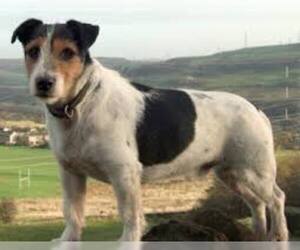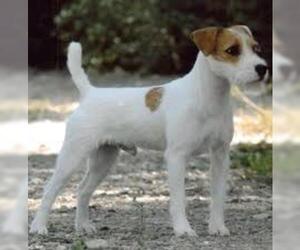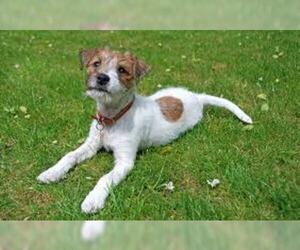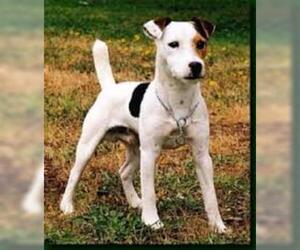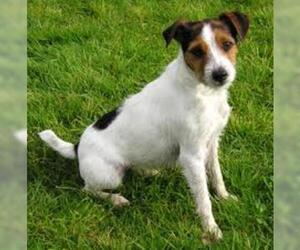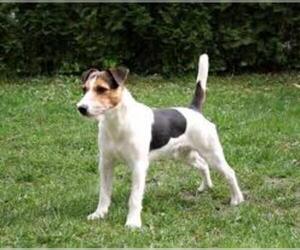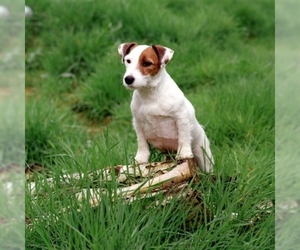
All about Parson Russell Terrier dog breed
A.K.A. :Parson, PRT, Parson Jack, Parson Pup, Gentleman’s Terrier, Fox Terrier Type B, British Parson, Parson Hunter, Parson Companion, Roughcoat Parson, Parson Scout, White Terrier, Parson Rascal, Country Terrier, Parson Jumper
Size
Grooming requirements
Exercise requirements
Good with other dogs
Watchdog ability
Energetic
Training requirements
Playful
Affectionate
Good with other pets
Good with children
Good with strangers
Winter
Summer
Healthiness
Protective
Life Span
| Pure Breeds | Member |
| Breeds A - Z | P |
| Breeds by Group | Terrier |
| Breeds by Trait | Good With Kids High Stamina Dog Breeds Low Shedding Smartest Dog Breeds |
| Overview: | The Parson Russell Terrier is a lively and intelligent breed, originating in the mid-19th century in England, specifically bred by Reverend John (Jack) Russell for fox hunting. These small yet sturdy dogs typically stand between 13-14 inches tall and weigh 13-17 pounds, characterized by their athletic build, V-shaped ears, and distinctive double coat, which can be smooth or broken. Their temperament is famously spirited, confident, and energetic, making them a joy for active individuals or families. While devoted and affectionate with their loved ones, their high prey drive and need for mental stimulation mean they thrive in environments where they receive ample exercise and training. They are generally not ideal for apartment living unless their owners are committed to daily vigorous outdoor activities. Health considerations for the breed include luxating patellas, eye disorders like lens luxation, and deafness, though reputable breeders screen for these conditions to ensure healthy offspring. Overall, the Parson Russell Terrier is a loyal and entertaining companion for those ready to embrace their vibrant personality. |
F.A.Q.
All You Need to Know About the Parson Russell Terrier Breed
The Parson Russell Terrier is a lively, intelligent breed originating from England, initially bred for fox hunting. These charming dogs typically weigh 13-17 pounds and stand 13-14 inches tall, boasting a sturdy, athletic build with either a smooth or broken coat. Known for their energetic and fearless temperament, Parson Russells are incredibly loyal and make fantastic companions for active individuals or families. Their intelligence means they are highly trainable but do require consistent, positive reinforcement and early socialization. While adaptable, they thrive best in homes with a yard and are generally not suited for apartment living due to their high energy levels and vocal nature. They need at least an hour of vigorous exercise daily and weekly brushing to maintain their coat. Common health considerations include patellar luxation, eye conditions, and deafness, but with proper care, they enjoy a lifespan of 13-15 years. If you're seeking a spirited, devoted, and engaging canine partner, the Parson Russell Terrier could be your perfect match.Parson Russell Terrier WeightThe average weight for a Parson Russell Terrier is between 13-17 pounds. Healthy adult Parson Russell Terriers typically fall within this range, with very little noticeable difference in Parson Russell Terrier weight between males and females. Maintaining a healthy weight for Parson Russell Terrier is crucial for their well-being and active lifestyle.
How Tall is a Parson Russell Terrier? Understanding Parson Russell Terrier HeightWhen considering a Parson Russell Terrier, understanding their average size is key to envisioning them in your home! These spirited little dogs have a fairly consistent Parson Russell Terrier height range, measured at the shoulder.The typical adult Parson Russell Terrier height falls between 13 to 14 inches at the shoulder. This range represents the breed standard and what you can generally expect from a well-bred individual.While there isn't a significant difference in how tall is a Parson Russell Terrier based on gender, you might occasionally see slight variations. Some males may be at the upper end of the range, while some females might be at the lower end. However, these differences are usually minimal and still fall within the accepted standard.Individual genetics also play a role, meaning some dogs may be slightly smaller or larger than the average, but reputable breeders strive to produce dogs within the established height guidelines. So, if you're looking for a compact and agile companion, the Parson Russell Terrier height of 13-14 inches makes them a perfect fit!
Parson Russell Terrier ColorsThe Parson Russell Terrier primarily comes in white with markings. AKC recognized Parson Russell Terrier colors include white with black, white with tan, or white with black and tan markings. These markings can appear as patches, spots, or a saddle. The amount of color can vary, but white should always be the predominant color, making up at least 51% of the coat.While not officially recognized by major kennel clubs like the AKC, some breeders may occasionally produce rare coat types or exotic Parson Russell Terrier variations with less common colorings. However, these are extremely rare and often indicate a mix with another breed, or a genetic variation not typically associated with the purebred Parson Russell Terrier standard. Prospective buyers should be wary of breeders advertising such unusual colors, as they are not accepted for show by the AKC and may indicate a lack of adherence to breed standards. Focus on the recognized Parson Russell Terrier colors for a true-to-type representation of the breed.
The Parson Russell Terrier personality is characterized by a lively, intelligent, and confident disposition. They are known for their bold and energetic nature, always ready for an adventure. Parson Russell Terriers are generally friendly with their families, displaying strong loyalty and a desire to be involved in household activities. Their sociability with strangers can vary; while some are immediately welcoming, others might be more reserved initially, reflecting their terrier independence.Due to their high energy levels and need for mental stimulation, Parson Russell Terriers are not ideally suited for apartment living unless owners are committed to extensive daily exercise and engagement. They thrive in environments where they have space to run and explore.When it comes to children, Parson Russells can be wonderful companions for older, respectful children who understand how to interact with an active dog. Their playful nature can make them good playmates, but supervision is always recommended, especially with very young children, to ensure positive interactions. Regarding other pets, their strong prey drive, a hallmark of their terrier heritage, means they may not always be compatible with small animals like cats, rodents, or birds, especially if not introduced and socialized from a young age. With other dogs, especially those of similar size and energy, they can often coexist happily, though individual personalities will always play a role. The temperament of Parson Russell Terrier is a delightful blend of playful exuberance and devoted companionship, requiring an active and engaged owner.
The Parson Russell Terrier temperament is a spirited, confident, and intelligent one. These are loyal companion dogs known for their boundless energy and affectionate nature with their families. They are generally friendly and sociable with people, though early socialization is crucial for well-adjusted behavior. While adaptable, their high energy levels mean they are not ideal for apartment living unless extensive daily exercise is provided. When it comes to behavior with children, Parson Russells can be wonderful playmates due to their playful spirit, but supervision is always recommended, especially with very young children, to ensure respectful interaction. Their strong prey drive means behavior with other pets can be variable; they may coexist peacefully with cats or smaller animals if raised together, but their instinct to chase requires caution and proper introductions. Parson Russells are known for their stubbornness, a characteristic often linked to their intelligence and independent spirit, requiring consistent, positive reinforcement training. They are not overly sensitive but respond best to fair and firm guidance rather than harsh corrections. Overall, the personality traits of a Parson Russell Terrier make them an engaging, active, and devoted family member for those who can meet their exercise and training needs.
Parson Russell Terrier Care: Daily Maintenance & Health TipsParson Russell Terrier care is relatively straightforward, but consistent attention ensures a happy, healthy companion. This breed is known for its energetic nature, so how to care for a Parson Russell Terrier centers on meeting their activity levels and maintaining their distinct coat.Grooming: Parson Russell Terriers have a wiry, double coat that requires weekly brushing to remove loose hair and prevent matting. Stripping (hand-plucking dead hair) is recommended every few months to maintain coat texture and shed-free living. Occasional baths are sufficient, or as needed when dirty. Nail trims should be done regularly, typically every 3-4 weeks. Dental hygiene is crucial; daily or every-other-day tooth brushing is ideal to prevent dental disease, a common concern. Wrinkle and ear cleaning is generally not a daily task for Parsons as they don't have prominent skin folds or droopy ears prone to infection like some breeds. Clean ears as needed with a vet-approved solution, especially after swimming.Exercise: Despite their small size, Parson Russell Terriers are not a low-energy dog breed. They are highly active, intelligent, and require significant daily exercise and mental stimulation. Aim for at least 60-90 minutes of vigorous activity daily, including brisk walks, running, fetch, and playtime. They excel in dog sports like agility and earthdog trials. Without adequate exercise, they can become bored and destructive.Dietary Considerations: Feed a high-quality, balanced dog food appropriate for their age, size, and activity level. Portion control is essential to prevent obesity, as weight management is a key aspect of health tips for Parson Russell Terrier. Avoid table scraps and excessive treats. Consult your veterinarian for specific dietary recommendations.Climate Sensitivity: Parson Russell Terriers are not brachycephalic (short-nosed) and generally tolerate various climates well. However, like any dog, they can be susceptible to overheating in extreme heat during strenuous exercise and should always have access to fresh water and shade. Their wiry coat offers some protection in cooler weather, but they shouldn't be left outdoors for extended periods in freezing temperatures.Common Health Concerns: Beyond dental issues and obesity, Parson Russell Terriers are generally a healthy breed. However, owners should be aware of potential skin issues (allergies, hot spots) and certain orthopedic conditions like patellar luxation. Regular veterinary check-ups are vital for early detection and preventative care.In summary, Parson Russell Terrier care involves consistent grooming, ample exercise, a balanced diet, and proactive health monitoring. They are a robust, intelligent, and fun-loving breed for active owners.
The Parson Russell Terrier activity level is high, reflecting their heritage as energetic working dogs. These terriers require a significant amount of daily physical and mental stimulation to stay happy and well-behaved.Expect your Parson Russell Terrier to need at least 60-90 minutes of vigorous exercise daily, broken into several sessions. This isn't just a leisurely stroll; think fast-paced walks, running, hiking, or engaging in dog sports like agility, flyball, or earthdog trials. They thrive on having a "job" to do, and their intelligence combined with their drive means they excel at activities that challenge both their bodies and minds.How active are Parson Russell Terriers? Very active! They love to play fetch, chase toys, and explore. Their playful nature makes them excellent companions for active families who enjoy outdoor activities. While they can be calm indoors after sufficient exercise, without it, they are prone to destructive behaviors like excessive barking, digging, or chewing due to boredom and pent-up energy.It's important to note that Parson Russell Terriers balance short bursts of intense energy with periods of rest. They aren't constantly "on" but require those intense bursts to truly satisfy their exercise needs.Exercise needs for this breed are non-negotiable. They are not suitable for low-energy households or individuals who cannot commit to providing consistent and engaging physical outlets. Their boundless enthusiasm and prey drive mean a secure, fenced yard is highly recommended for safe off-leash play.Important Note on Brachycephalic Anatomy (Limitations): It's crucial to clarify that the Parson Russell Terrier is NOT a brachycephalic breed. They have a well-proportioned muzzle, allowing them to breathe freely and participate in high-intensity activities without the respiratory limitations associated with flat-faced breeds. This anatomical structure supports their high activity level and endurance.
Parson Russell Terriers are not brachycephalic, so brachycephalic dog care practices are typically unnecessary. However, their high energy levels and compact build can contribute to heat sensitivity, especially during intense activity or warm weather. Providing hydration, shade, and rest breaks is important. Spinal problems such as spinocerebellar ataxia are rare but serious, requiring genetic screening and early detection.
Understanding how to keep Parson Russell Terrier healthy involves regular veterinary checkups, genetic testing for breed-specific conditions, joint and eye screenings, consistent grooming, weight management, and safe exercise routines. With attentive care, Parson Russell Terriers can enjoy a lively, intelligent life of 13–15 years.
Breed Breakdown: What Experts Say About the Parson Russell Terrier
I would rate the "Size" trait of the Parson Russell Terrier at a 4.While not miniature, the Parson Russell Terrier is undeniably a small to medium-sized dog. They typically stand between 13-14 inches tall and weigh 13-17 pounds, placing them firmly in the smaller half of companion dog breeds. Their athletic and compact body structure gives them a robust appearance for their size, but they remain agile and relatively lightweight. When compared to breeds like Chihuahuas (1-2) or even Beagles (5-6), they are noticeably smaller. However, they are larger than true toy breeds. This makes them well-suited for apartment living, especially if they receive adequate daily exercise. Their compact size also makes them excellent travel companions, fitting comfortably in most pet carriers designed for in-cabin flight or easily traveling in a car without taking up excessive space. Households with space constraints will find them adaptable, as long as their energetic nature is accommodated with walks and playtime.
I would rate the Parson Russell Terrier's grooming requirements as a 7.While their short, dense, and naturally wiry double coat is generally easy to keep clean and doesn't require professional stripping for show, it's far from "wash and wear." They are moderate to high-shedders, especially seasonally, and their wiry coat benefits greatly from regular hand-stripping (every 2-3 months) to remove dead hair and maintain its texture and natural weather-resistant qualities. Without stripping, the coat can become soft, lose its color, and shed more excessively. Weekly brushing, even for non-stripped coats, is necessary to minimize shedding and keep the coat healthy. Their ears, while not prone to excessive wax buildup, should be checked weekly for cleanliness and signs of infection due to their active outdoor lifestyle. Nail trimming is crucial and needs to be done every 2-4 weeks, as overgrown nails can cause discomfort and impact their gait. Bathing is typically needed only when dirty, but their active nature means this might be more frequent for some owners. They generally have healthy skin and are not overly prone to skin fold issues or severe allergies, but their love for digging and exploring can lead to minor cuts or scrapes that need attention. Compared to many companion dogs, their need for regular hand-stripping to maintain coat health and minimize shedding puts them in the higher maintenance category, making them not quite as easy to care for as a truly low-maintenance breed.
I would rate the Parson Russell Terrier's exercise requirements at an 8 out of 10.This breed possesses an incredibly high energy level and an insatiable desire for activity, making them far from a "minimal activity" companion. Parsons were bred for hunting and have the stamina and drive to work all day. They thrive on structured routines that involve significant physical exertion and mental stimulation. Daily long walks are a bare minimum, and they truly excel with more vigorous activities like running, hiking, or dedicated playtime involving fetch and chasing. Their lean, athletic build and boundless enthusiasm mean they have excellent tolerance for sustained movement. Furthermore, they are highly intelligent and agile, making them outstanding candidates for dog sports such as agility, flyball, and earthdog trials, which satisfy both their physical and mental needs. Without adequate exercise, a Parson Russell Terrier can become bored, destructive, and even anxious, demonstrating that they absolutely require a dedicated owner willing to provide consistent and challenging physical outlets to remain healthy and well-adjusted. They are not a brachycephalic breed, so they do not have respiratory limitations in that regard.
I'd rate the Parson Russell Terrier's "Watchdog Ability" at a 9 out of 10.Parsons are exceptionally alert and possess a strong territorial instinct, making them highly effective watchdogs. They have a keen sense of hearing and will readily bark at unfamiliar sounds or people approaching their home. This isn't a passive companion; they are very much capable of providing meaningful early warnings. While not typically aggressive, their persistent barking and assertive demeanor are usually enough to deter all but the most determined intruders, making it clear that a new presence has been noted and is being announced. They're not just yappy; their barks are purposeful and often accompanied by a ready stance, indicating they are actively monitoring the situation.
I would rate the "Good with Other Dogs" trait of the Parson Russell Terrier as a 6.Parson Russell Terriers, while often quite affectionate with their own human families, can be a mixed bag when it comes to other dogs. Their strong prey drive and bold, confident personalities mean they aren't naturally inclined to be universally sociable with all canines. They can be very compatible with other dogs, especially if raised with them or extensively socialized from a young age. In such cases, they can be playful and enjoy canine company.However, their tendency towards dominance and their high energy can lead to conflict with dogs who don't appreciate their assertive play style or who are more submissive. They are often unfazed by larger dogs, which can sometimes lead to them getting into situations their size doesn't quite prepare them for. Introductions to unfamiliar dogs, particularly those of the same sex or similar temperament, need to be carefully managed. They thrive in canine company when they've been properly introduced and boundaries are established, but they absolutely require early and consistent socialization to encourage peaceful coexistence, and even then, some individuals may never be truly "dog-friendly" with every dog they meet. They are adaptable to multi-dog households but often require a clear hierarchy and vigilant supervision to prevent squabbles.
I would rate the Parson Russell Terrier's "Energetic" trait a 9 out of 10.The Parson Russell Terrier is a quintessential high-energy breed. They possess an incredibly robust and enduring activity level, a boundless playfulness that can last for hours, and an insatiable need for physical stimulation. Bred for hunting and working, they have the stamina to keep going long after many other breeds would tire, excelling in outdoor and athletic pursuits like agility, flyball, and long hikes. They are inherently active and always ready for an adventure, making them far from laid-back compared to most companion dogs. Fortunately, the Parson Russell Terrier is *not* a brachycephalic breed. Their well-proportioned muzzle and respiratory system allow them excellent stamina and exercise tolerance, enabling them to comfortably participate in prolonged physical activities without the breathing difficulties associated with brachycephaly.
I'd rate the Parson Russell Terrier's "Training Requirements" a 7 out of 10.While intelligent and capable of learning a great deal, the Parson Russell Terrier is far from a "very easy" train. Their high energy, strong prey drive, and innate terrier stubbornness contribute to this rating. They possess a good attention span for things they find stimulating, but can easily become distracted by scents or movement in their environment. Responsiveness to commands can be excellent when engaged, but their independent nature means they'll often weigh their own desires against your request. Consistent training, starting from a young age, is absolutely crucial. Positive reinforcement is highly effective as they are generally eager to please their handler, but without clear boundaries and consistent follow-through, their independent spirit can quickly lead to them taking advantage. This breed is not particularly beginner-friendly and typically requires experienced handling and a structured routine to channel their considerable drive and intelligence into desired behaviors, rather than allowing them to develop their own, often mischievous, agenda.
I'd rate the Parson Russell Terrier's "Playful" trait a solid 9 out of 10. These dogs are incredibly high-spirited and embody a joy for life that's truly infectious. They possess an almost insatiable desire for games, whether it's a vigorous game of fetch, a puzzle toy challenge, or a lively tug-of-war. Their attention-seeking behavior often manifests as nudging, vocalizing, or bringing you a toy, clearly indicating their readiness for interaction. They respond to toys and playtime with an unparalleled enthusiasm, often bouncing and wiggling with excitement. Their overall daily life is marked by an energetic curiosity and an eagerness to engage, making them naturally spirited companions who are far from laid-back compared to most other companion dogs.
I would rate the Affectionate trait of the Parson Russell Terrier as a 7/10.While undoubtedly loyal and deeply devoted to their families, the Parson Russell Terrier isn't typically the most overtly demonstrative or constant "velcro dog." They thrive on companionship and are incredibly people-oriented, often following their family members from room to room. Their loyalty is unwavering, and they are quite sensitive to the emotional atmosphere within the home. However, their independent and energetic nature means they aren't always content to simply be a lap dog for extended periods. They enjoy physical closeness and will definitely seek out attention, a good scratch behind the ears, or a snuggle on the couch, but they also have a strong drive for activity and exploration. They appreciate affection and it's essential for their well-being, but they might not initiate constant cuddling or desire to be physically on top of you as much as some other companion breeds. They value a good play session or an adventurous outing just as much as a quiet cuddle.
I would rate the "Good with Other Pets" trait of the Parson Russell Terrier as a 6.The Parson Russell Terrier's strong prey drive is the primary factor limiting a higher score. While they can be very devoted and playful with their human families, their instinct to chase and "dispatch" small, furry creatures can make cohabitation with cats, rabbits, or smaller dogs challenging without significant early socialization and ongoing supervision. They are generally outgoing and friendly towards other dogs when properly introduced, but their confident and sometimes dominant personalities mean that resource guarding, while not universal, can emerge if not addressed through training. They are not naturally sociable with all other species and require consistent, positive exposure from a young age to learn appropriate interactions. Even with excellent training, a Parson Russell Terrier may always view a cat as a potential chase object, demanding vigilance in a multi-pet household. They are adaptable to a multi-pet household in the sense that they can learn to tolerate or even bond with other animals, but this is usually a result of diligent effort from the owner rather than an inherent, universal friendliness.
The Parson Russell Terrier would rate a 6 out of 10 for the "Good with Children" trait. While they are energetic and playful, which can be a good match for older, active children, their strong prey drive, independent nature, and sometimes feisty temperament mean they aren't inherently the most patient or tolerant breed for younger kids. They thrive with training and supervision, and need clear boundaries, as they can be prone to nipping if their boundaries are crossed or they feel threatened. They are not naturally gentle and affectionate in the way some other breeds are, and early socialization is crucial. Their tolerance for noise and handling can vary, but their high energy levels mean they need outlets for their zest, which might overwhelm very young children. With proper introduction, consistent training for both dog and children, and adult supervision, they can be good companions for active families, but they are not a "set-it-and-forget-it" breed for a family with kids.
The Parson Russell Terrier rates a solid 7 for "Good with Strangers." They are generally a friendly and confident breed, not typically prone to shyness or aggression. They are more likely to greet unfamiliar adults with an inquisitive tail wag and a curious sniff than a bark or retreat. Their intelligent and alert nature means they will certainly acknowledge a stranger's presence, but this usually manifests as an observation rather than a protective display. While not as universally effusive as, say, a Labrador Retriever, they are adaptable in public and can be comfortable in guest-filled environments with proper socialization. They naturally lean towards being outgoing, though early positive experiences with various people will solidify their confident and welcoming demeanor.
I would rate the Parson Russell Terrier's winter tolerance at a 6 out of 10. While not equipped for extreme cold, they possess a dense, harsh double coat that provides a fair degree of insulation. Their active nature and lean, athletic build mean they generate body heat readily during activity. They are not brachycephalic, so breathing in cold air is less of an issue than for some breeds. However, their smaller size and relatively low body fat mean they are susceptible to hypothermia if exposed to very cold temperatures for prolonged periods, especially if inactive or wet. They can generally enjoy outdoor activity in cold climates for reasonable durations, but owners in areas with harsh winters should be mindful of their limits. Compared to many companion dogs, they might tolerate cold slightly better than very short-coated or toy breeds, but they definitely require more special care than breeds like Siberian Huskies or Newfoundlands. Owners should provide warm coats for extended outdoor time, monitor for signs of discomfort, and limit exposure in freezing temperatures, particularly when the wind chill is significant.
I'd rate the Parson Russell Terrier's "summer" tolerance as a 6 out of 10.While not as heat-sensitive as brachycephalic breeds, Parson Russells are still a northern breed with a dense double coat designed for colder climates. They are active, energetic dogs with a high prey drive, meaning they'll push themselves even when overheated. Their longer muzzle helps with respiration compared to pugs or bulldogs, but they can still struggle to regulate their body temperature during strenuous activity or prolonged exposure to high heat and humidity. They have a moderate risk of heatstroke if not properly managed. During hot weather, outdoor activity should be limited to cooler parts of the day, and shade and fresh water are absolutely essential. They will require special care in summer months compared to other companion dogs, particularly those with less dense coats or more sedentary lifestyles, meaning owners need to be proactive about monitoring their dog for signs of overheating and providing climate-controlled environments for rest. They are not a breed that can be left outside unsupervised for extended periods in summer.
I would rate the Parson Russell Terrier's "Healthiness" trait as an 8 out of 10.This breed is generally considered robust and enjoys a relatively long life expectancy, often reaching 13-16 years. They are not prone to the severe breathing difficulties seen in brachycephalic breeds or the widespread joint issues prevalent in some larger breeds. While they do have some genetic predispositions, such as luxating patella, certain eye conditions (like primary lens luxation), and occasional deafness, these issues are not universally present and responsible breeding practices, including genetic testing, significantly mitigate their occurrence. Compared to many other companion dogs, the Parson Russell Terrier is relatively low-maintenance in terms of health concerns, requiring standard preventive care like vaccinations, regular vet check-ups, and a healthy diet. They are active dogs, and their physical activity contributes to their overall fitness. While no breed is entirely free from health concerns, the Parson Russell Terrier exhibits a strong natural resilience and a lower incidence of severe, debilitating conditions, making them a generally healthy and hardy companion.
I would rate the "Protective" trait of the Parson Russell Terrier as a 6 out of 10.While not a true guard dog, the Parson Russell Terrier's inherent terrier nature contributes to a notable level of protectiveness. They are highly alert and quick to notice anything out of the ordinary, often barking to signal a perceived threat. Their territorial instincts are strong, and they will readily "defend" their home and family, primarily through vocalizations and a fearless demeanor, rather than physical confrontation. Their loyalty to owners is unwavering, and this devotion fuels their protective tendencies, making them want to keep their loved ones safe.Their reaction to strangers is typically one of wariness and suspicion, often accompanied by barking until they determine the stranger is not a threat. This makes them excellent watchdogs – you'll definitely know if someone is at the door or on your property. However, their suitability as a guard dog is limited. While brave and tenacious, their small size means they are unlikely to deter a determined intruder through physical force. They are more likely to create a loud and persistent commotion that *might* deter an opportunistic individual, but they are not built for meaningful physical protection. Ultimately, the Parson Russell Terrier is primarily a companion dog that happens to come with a strong, vocal, and often amusing "protective" streak. They offer a sense of security through their vigilance and willingness to alert, rather than through direct, physical safeguarding.
I would rate the "Life Span" trait of the Parson Russell Terrier breed a 9 out of 10.Parson Russell Terriers are renowned for their exceptional longevity. Their average life expectancy typically ranges from 13 to 16 years, with many individuals living even longer. This makes them a long-lived breed compared to most other companion dogs. They are generally a robust and healthy breed with relatively few common hereditary health issues that significantly shorten their lifespan. While responsible breeding and care, including a good diet, regular exercise, and preventative veterinary care, certainly contribute to their longevity, their inherent genetic predisposition for a long and healthy life is a significant factor.
Parson Russell Terrier Dogs for adoptionSee all dogs for adoption
Parson Russell Terrier BreedersSee all breeders
Similar Dog Breeds for Parson Russell Terrier
Quick Breed Selector 0 - not important, 1 - smallest, 10 - largest
Variants & Mistakes :Parsons Russell Terrier, Parson Ruseel Terrier, Person Russell Terrier, Parson Russel Terrier, Parson Russel Terier, Pason Russell Terrier, Parrson Russell Terrier, Parson Rusell Terrier, Parson Russel Terrie, Parson Rusel Terrier, Parsonrussell Terrier, Parson Rusell Terrie, Parson Russell Tereir, Parson Russell Terreir, Parsonrussell Terier, Parson Rusle Terrier, Parson Russell Terier, Parson Russle Terrier, Parson Russell Terrie, Parson Rusell Terier, Parson Russll Terrier, Parson Russel Terrer, Parson Rusell Terer, Parson Russal Terrier, Parsonrussell Terrer, Parsonrussell Rusell, Parsonrussell Rusle, Parsonrussell Russle, Parsonrussell Russll, Parsonrussell Rusll, Parsonrussell Rusl, Parsonrussell Russl, Parsonrussell Russe, Parsonrussell Russ, Parsonrussell Rus, Parsonrussell Ruse, Parsonrussell Rusel
